Advanced Features
Rules
You can edit rules to block sites in the options page, as well as in the "Block this site" dialog.
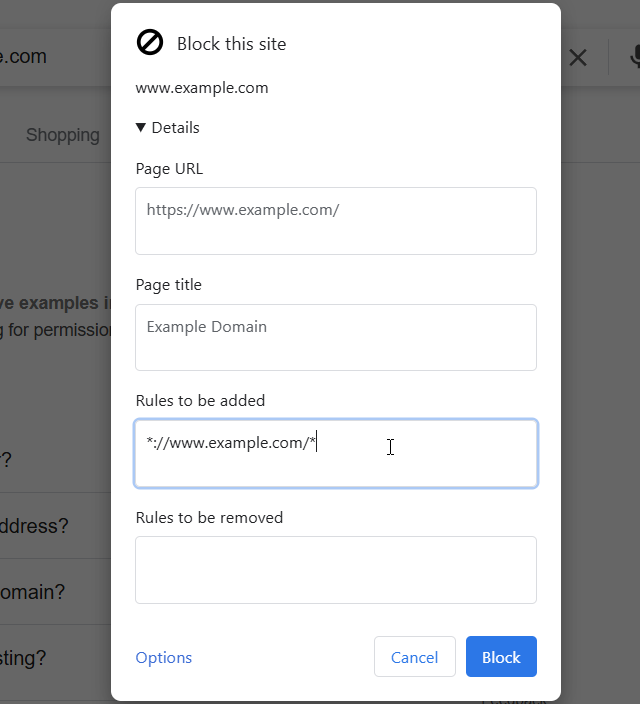
You can write rules using match patterns or expressions.
Match patterns
Match patterns are URLs that include wildcards. You can find more details in the MDN web docs.
Here are examples of valid match patterns:
| Pattern | Example matches |
|---|---|
*://example.com/*(URLs hosted at example.com) | http://example.com/https://example.com/hoge |
*://*.example.net/*(URLs hosted at example.net or its subdomains) | http://example.net/https://foo.example.net/hoge |
*://example.org/hoge/*(URLs hosted at example.org with paths starting with /hoge/) | http://example.org/hoge/fuga.html |
Here are examples of invalid match patterns:
| Invalid pattern | Reason |
|---|---|
*://www.qinterest.*/ | * is not at the start. |
Expressions
You can write rules by expressions.
Variables
Currently, url and title are available in expressions.
# Search results where URLs include "example"
url *= "example"
# Search results where titles start with "Something"
title ^= "Something"
Parts of a URL are also available: scheme, host, and path.
# Search results where schemes are HTTP
scheme="http"
# Search results where hosts end with ".example.com"
host $= ".example.com"
# Search results where paths include "blah", case-insensitive
path*="blah"i
Additionally, properties of search engine result pages are available. $site and $category are available for now.
# Block YouTube on Google Search
$site="google" & host="youtube.com"
# Block Amazon.com on image search
$category = "images" & host = "www.amazon.com"
String matchers
String matchers resemble CSS attribute selectors.
# Titles that are exactly "Example Domain"
title = "Example Domain"
# Titles that start with "Example"
title ^= "Example"
# Titles that end with "Domain"
title $= "Domain"
# Titles that include "ple Dom"
title *= "ple Dom"
To perform case-insensitive comparisons, use the i operator.
# Titles that end with "domain", case-insensitive
title $= "domain" i
Regular expressions
You can write more flexible expressions using regular expressions.
# URLs that include "example.net" or "example.org"
url =~ /example\.(net|org)/
# "=~" can be omitted
url/example\.(net|org)/
# "url" can be omitted
/example\.(net|org)/
# Titles that include "example domain", case-insensitive
title =~ /example domain/i
Note that regular expressions must be regular expression literals in JavaScript, surrounded by / (e.g., /example\.(net|org)/).
Here are examples of valid regular expressions:
| Regular expression | Example matches |
|---|---|
/^https:\/\/www\.qinterest\./(URLs starting with https://www.qinterest.) | https://www.qinterest.com/https://www.qinterest.jp/hoge |
/^https?:\/\/([^/.]+\.)*?xn--/(URLs including internationalized domain names) | http://例.テスト/ |
Here are examples of invalid regular expressions:
| Invalid regular expressions | Reason |
|---|---|
^https?:\/\/example\.com\/ | Not surrounded by /. |
/^https?://example\.com// | Inner / are not escaped. |
Logical operators
Logical "not" (!), "and" (&), and "or" (|) are supported.
# Block schemes other than HTTPS
!scheme="https"
# Block Amazon.com on image search
$category = "images" & host = "www.amazon.com"
# Titles including "example" or "domain", case-insensitive
title *= "example" i | title *= "domain" i
Use expressions with match patterns
You can append @if(expression) to match patterns.
# Block Amazon.com on image search
*://*.amazon.com/* @if($category="images")
Unblock rules
Match patterns or regular expressions preceded by @ mean that the specified sites are not blocked.
They can be used to unblock sites that are blocked by subscriptions. For example, if http://example.com/ is blocked by a subscription, you can unblock it using @*://example.com/*.
Highlighting rules
Match patterns or regular expressions preceded by @N (N=1,2,3,...) mean that the specified sites are highlighted.
For example, you can highlight example.com using @1*://example.com/*.
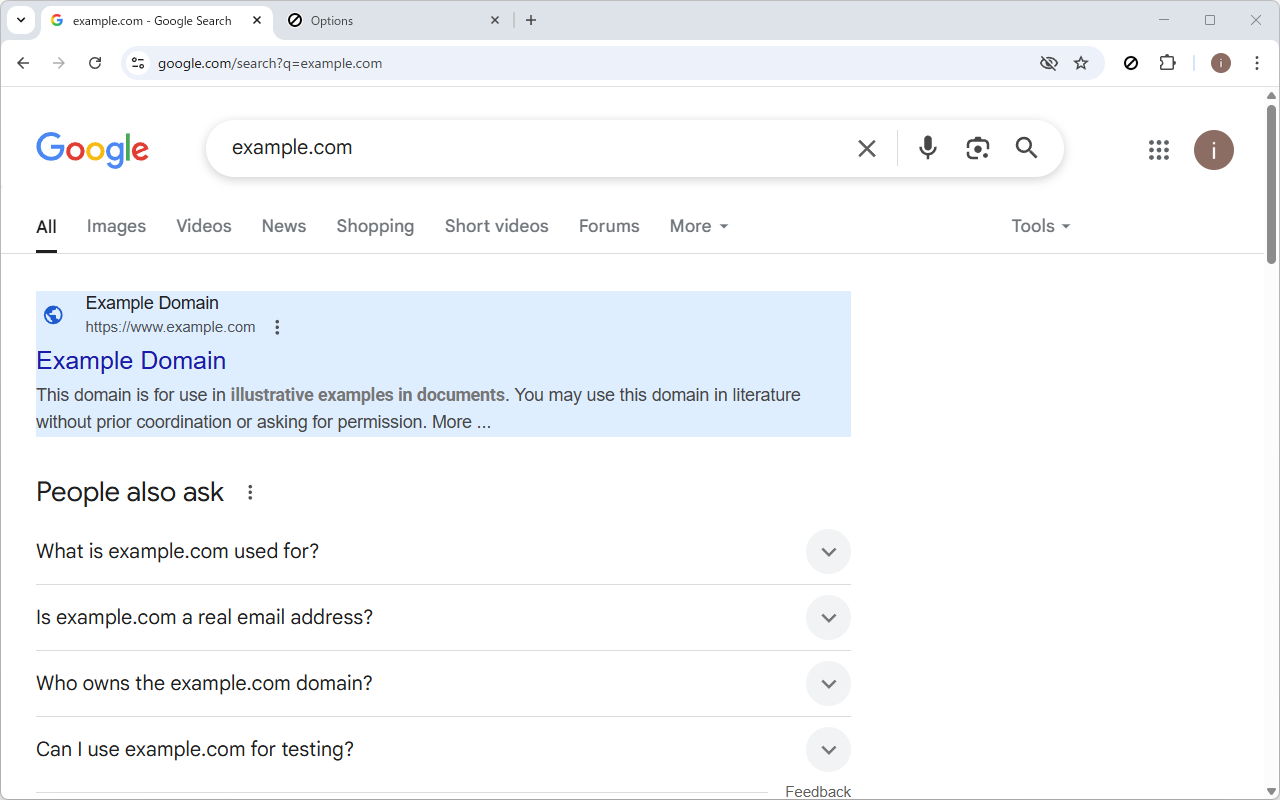
By default, only @1 (blue) is available. To change or add highlighting colors, see the "Appearance" section in the options page.
Comments
Comments begin with #. Although any line that cannot be interpreted as a rule is effectively a comment, a # comment is better in two ways:
#comments are guaranteed to be comments even if new syntax is introduced in the future.#comments can be placed after rules.
# Block pages where URLs are hosted at example.com or its subdomains
*://*.example.com/*
/example\.(net|org)/ # Block pages where URLs contain example.net or example.org
Other search engines
This extension supports Bing, Brave, DuckDuckGo, Ecosia, SearXNG, Startpage.com, Yahoo! JAPAN, and Yandex. This feature is disabled by default and can be enabled in the options page.
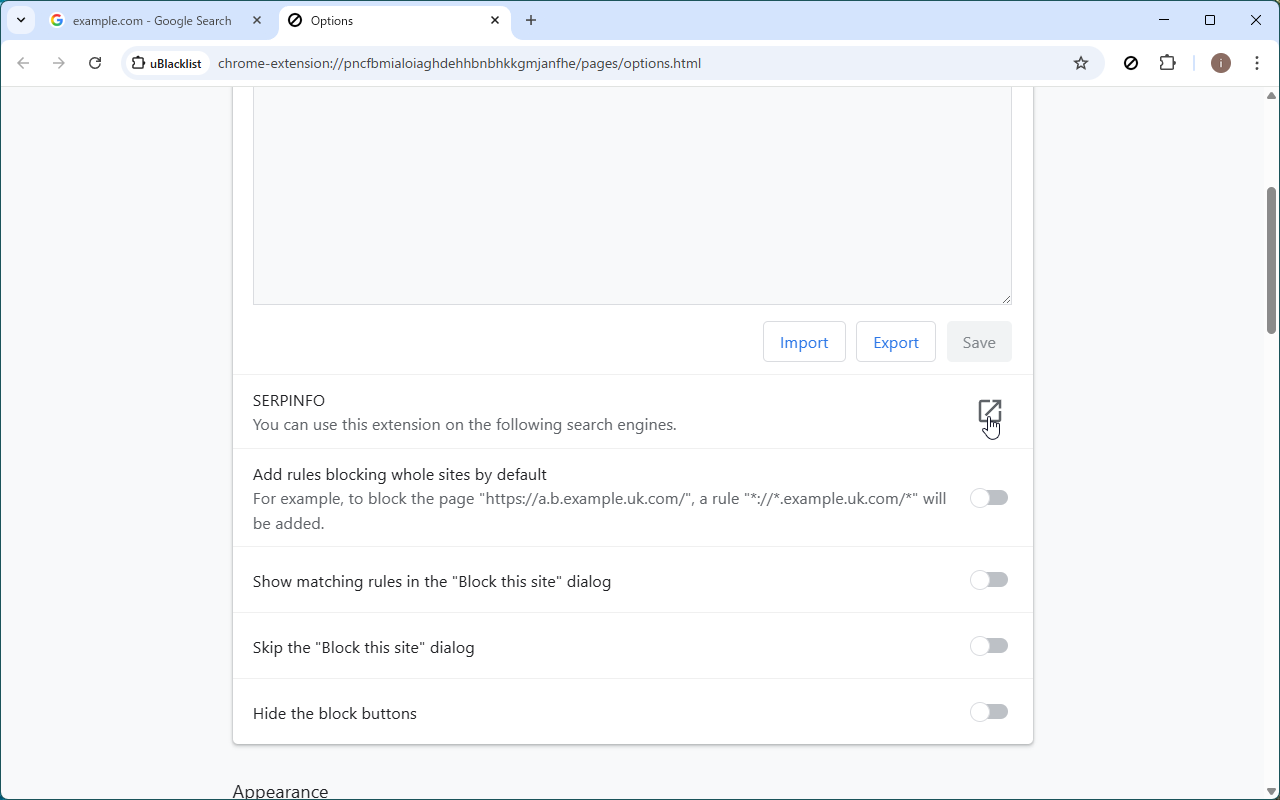
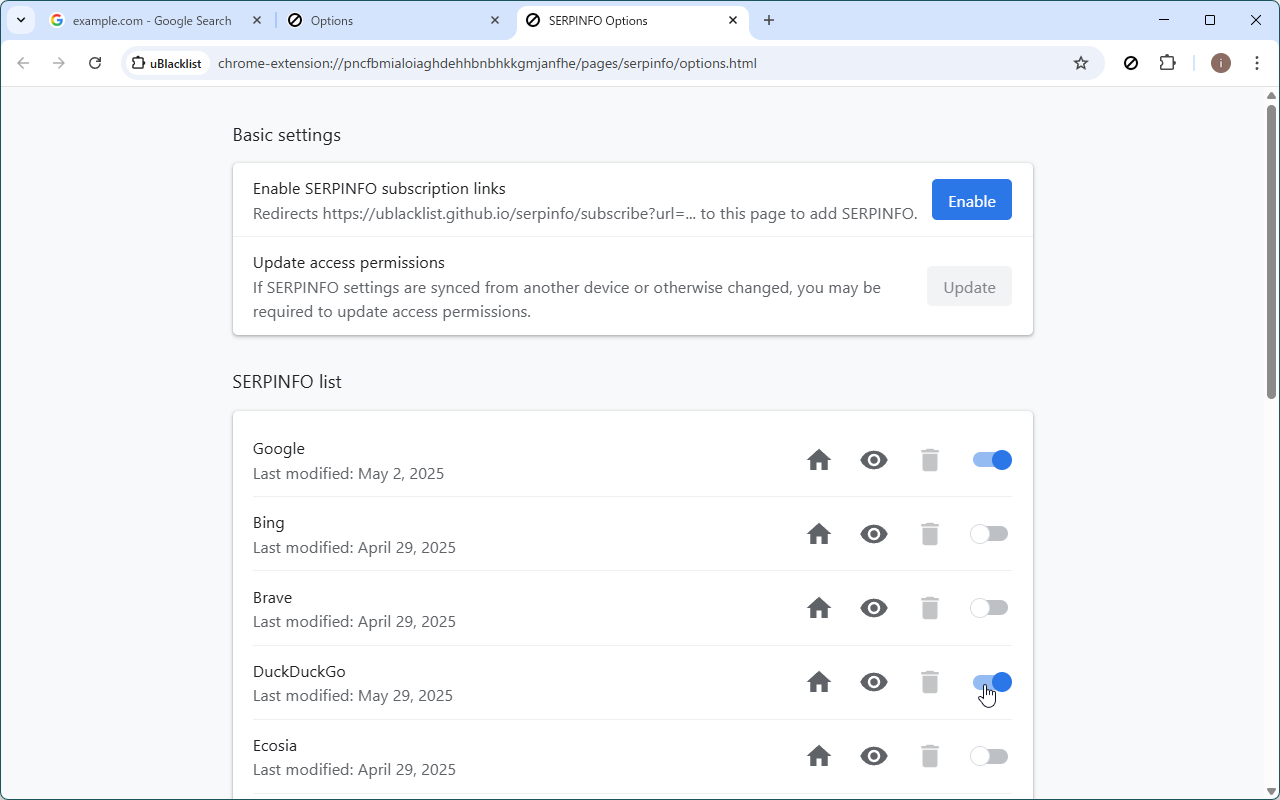
Sync
You can synchronize rulesets among devices using Google Drive or Dropbox.
To turn on sync, click the "Turn on sync" button in the options page and select a cloud.
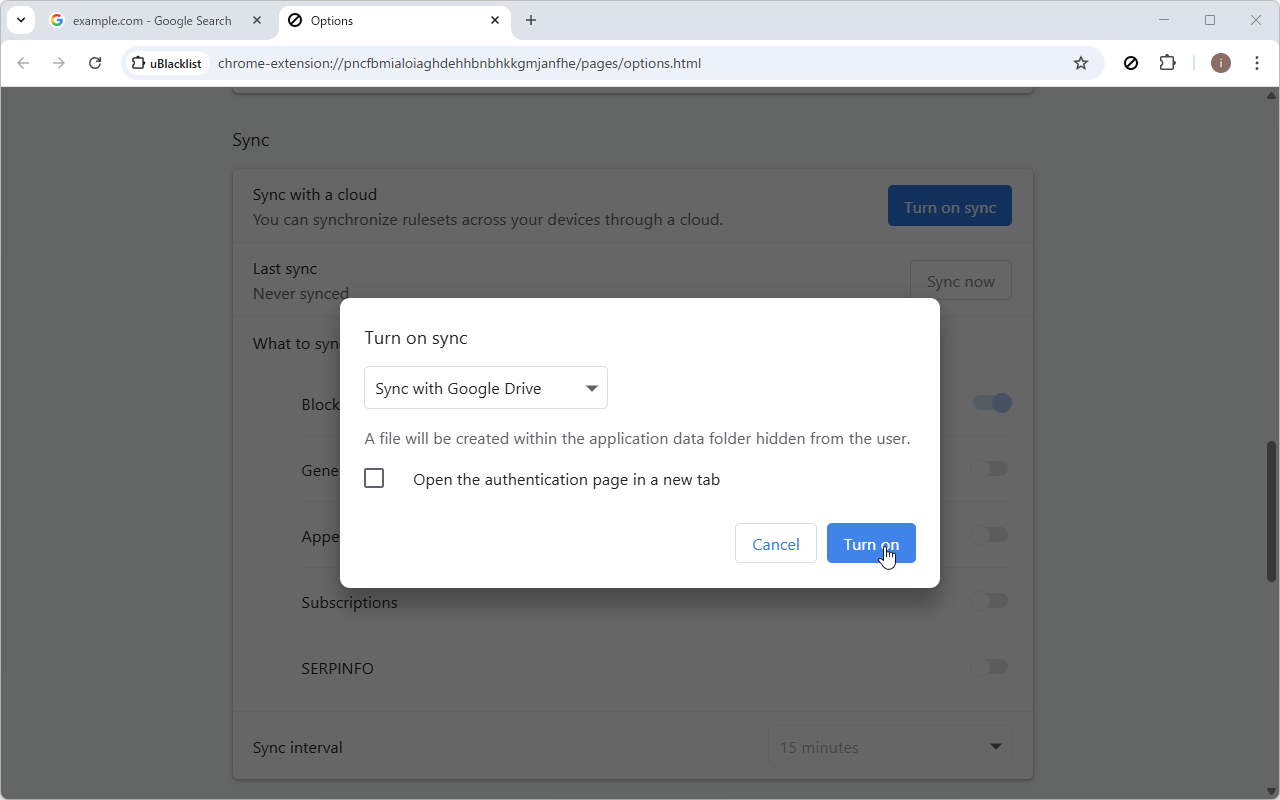
Follow the instructions in the dialog to authenticate.

Once authentication succeeds, your ruleset will be regularly synchronized with the selected cloud.
Google Drive
If you use Firefox or its derivatives, you will be required to permit access to https://www.googleapis.com.
The ruleset is saved in the application data folder on your Google Drive. It is hidden from you, although you can delete it in the settings page of Google Drive.
Dropbox
The ruleset is saved in the /Apps/uBlacklist/ folder on your Dropbox. The folder name may vary depending on your language.
Subscription
You can subscribe to public rulesets. A list of known public subscription lists can be found on the Subscriptions page.
To add a subscription, click the "Add subscription" button and enter the name and URL. You will be required to permit access to the origin of the URL.
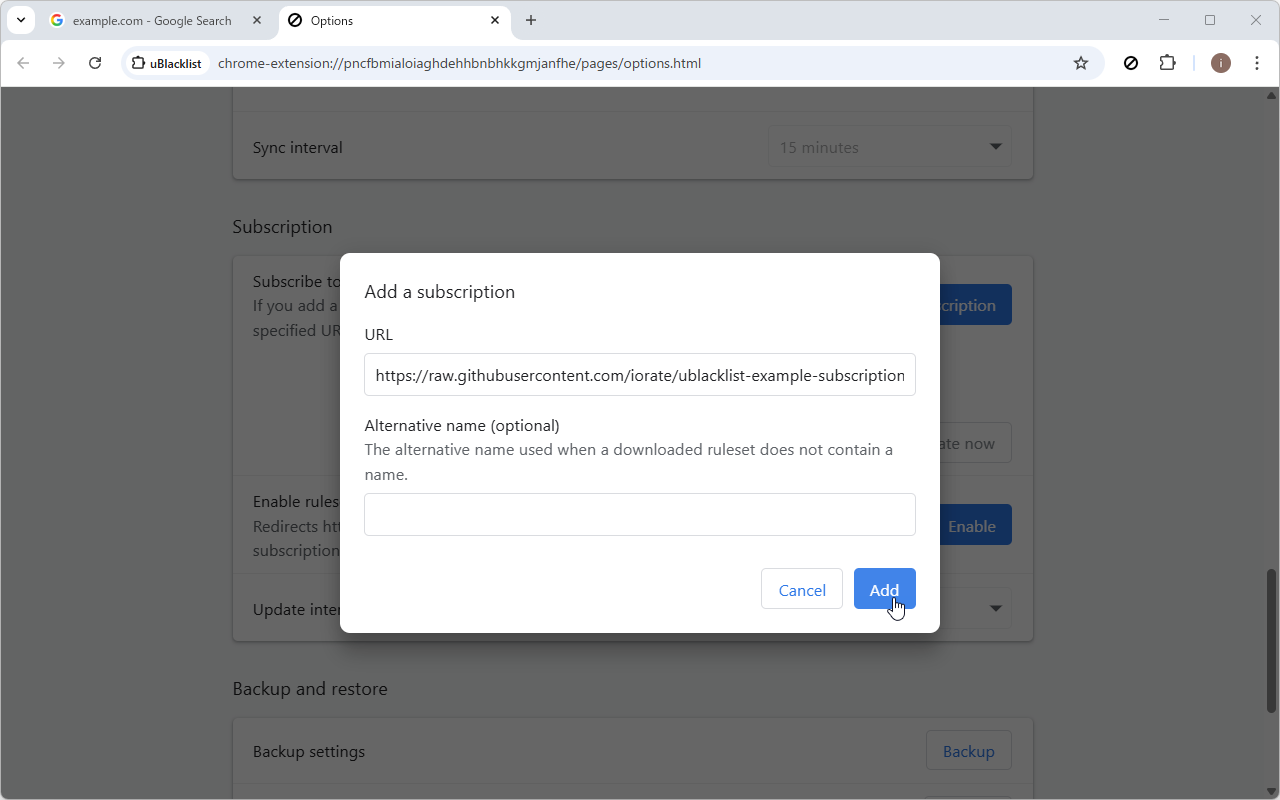
You can view, update, or remove a subscription.
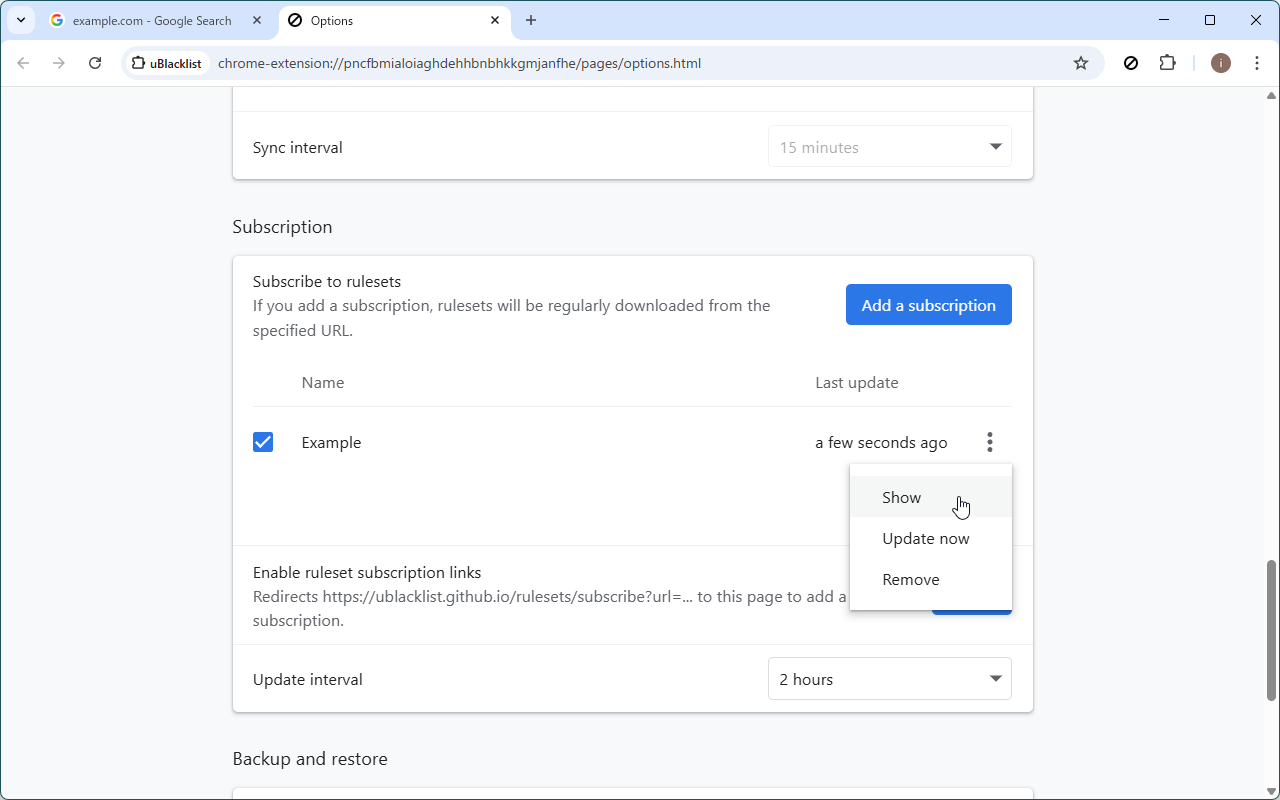
Publish a subscription
To publish a ruleset as a subscription, place a ruleset file encoded in UTF-8 on a suitable HTTP(S) server, and publish the URL.
You can prepend YAML frontmatter to your ruleset. It is recommended to set the name variable.
---
name: Your ruleset name
---
*://*.example.com/*
It is a good idea to host your subscription on GitHub. Make sure to publish the raw URL (e.g., https://raw.githubusercontent.com/iorate/ublacklist-example-subscription/master/uBlacklist.txt).
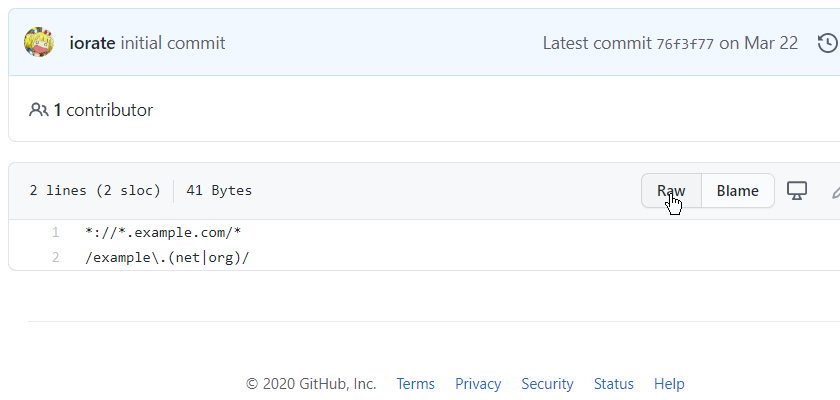
Subscription links
This feature is available in v8.11.0 or later. Users need to explicitly enable this feature by turning on "Enable ruleset subscription links" in the extension's options page.
For easier sharing of your subscription, you can create a subscription link in the following format:
https://ublacklist.github.io/rulesets/subscribe?url=<url-encoded-url>
Where <url-encoded-url> is your ruleset's URL after URL encoding. When users click this link, they will be directed to the extension's options page with your subscription pre-filled, making it easier for them to subscribe.
For example, if your ruleset is hosted at:
https://raw.githubusercontent.com/username/repository/master/ublacklist.txt
Your subscription link would be:
https://ublacklist.github.io/rulesets/subscribe?url=https%3A%2F%2Fraw.githubusercontent.com%2Fusername%2Frepository%2Fmaster%2Fublacklist.txt